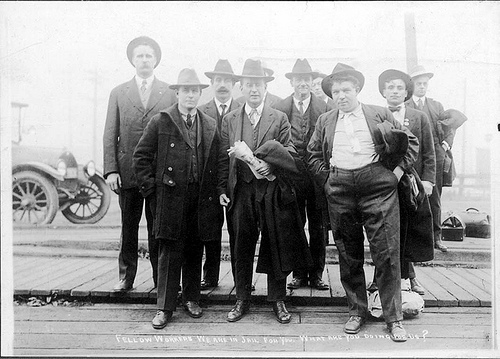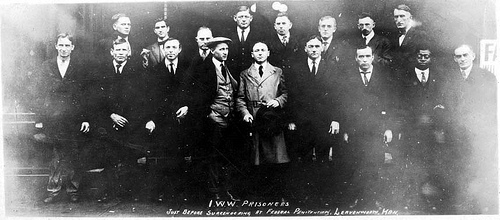The Humongous Fungus Among Us Issue
Who Stole the Four-Hour Workday?
A four-hour workday could solve a lot of our problems. If everyone worked fewer hours, there would be more jobs for the unemployed to fill. The economy wouldn't be able to produce quite as much, which means it wouldn't be able to pollute as much...
By Nathan Schneider
30 December 2014, VICE
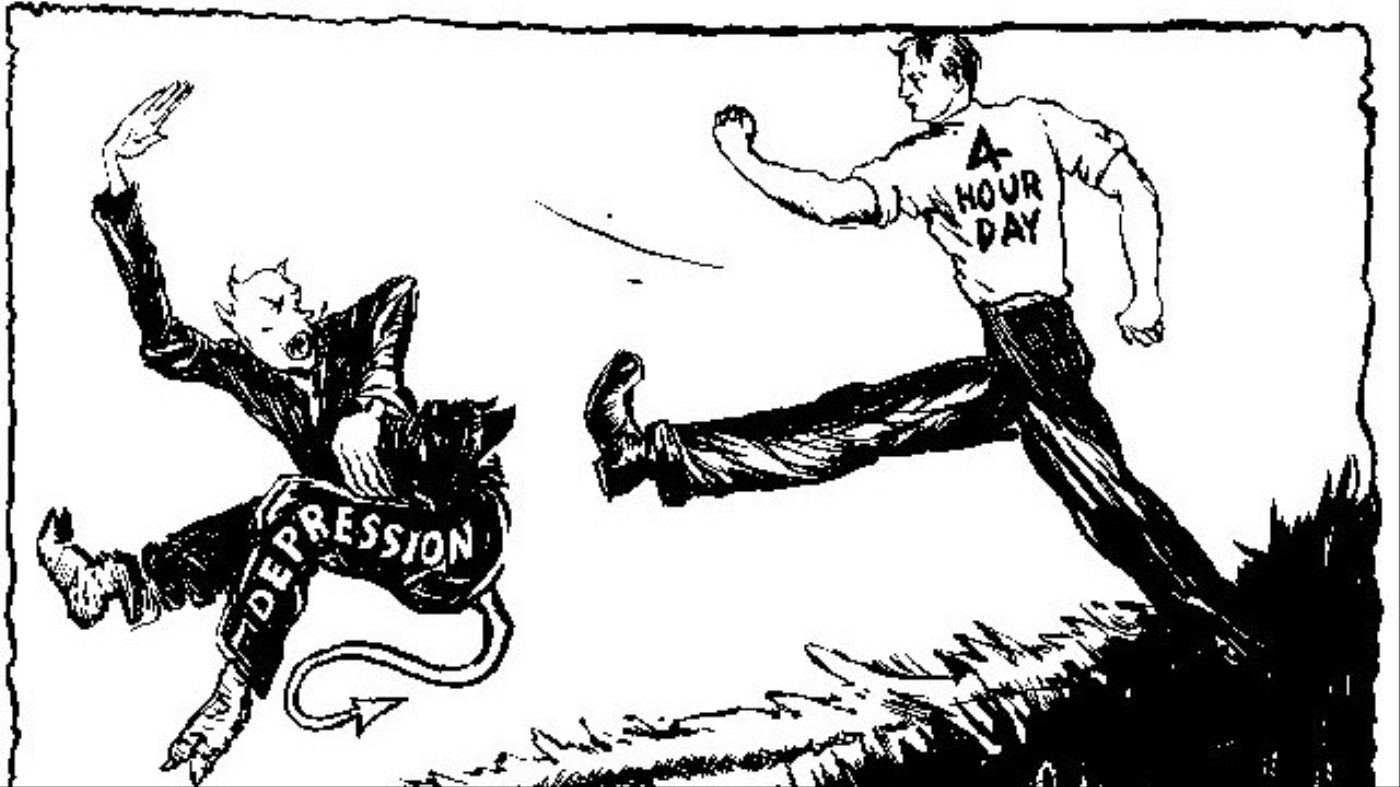
All illustrations are re-creations of four-hour-workday flyers from the 1930s and 40s. Original images courtesy of Industrial Workers of the World
Alex is a busy man. The 36-year-old husband and father of three commutes each day to his full-time job at a large telecom company in Denver, the city he moved to from his native Peru in 2003. At night, he has classes or homework for the bachelor's in social science he is pursuing at a nearby university. With or without an alarm, he wakes up at 5 AM every day, and it's only then, after eating breakfast and glancing at the newspaper, that he has a chance to serve in his capacity as the sole US organizer and webmaster of the Global Campaign for the 4 Hour Work-Day.
"I've been trying to contact other organizations," he says, "though, ironically, I don't have time."
But Alex has big plans. By the end of the decade he envisions "a really crazy movement" with chapters around the world orchestrating the requisite work stoppage.
A century ago, such an undertaking would have seemed less obviously doomed. For decades the US labor movement had already been filling the streets with hundreds of thousands of workers demanding an eight-hour workday. This was just one more step in the gradual reduction of working hours that was expected to continue forever. Before the Civil War, workers like the factory women of Lowell, Massachusetts, had fought for a reduction to ten hours from 12 or more. Later, when the Great Depression hit, unions called for shorter hours to spread out the reduced workload and prevent layoffs; big companies like Kellogg's followed suit voluntarily. But in the wake of World War II, the eight-hour grind stuck, and today most workers end up doing more than that.
The United States now leads the pack of the wealthiest countries in annual working hours. US workers put in as many as 300 more hours a year than their counterparts in Western Europe, largely thanks to the lack of paid leave. (The Germans work far less than we do, while the Greeks work considerably more.) Average worker productivity has doubled a couple of times since 1950, but income has stagnated—unless you're just looking at the rich, who've become a great deal richer. The value from that extra productivity, after all, has to go somewhere.
It used to be common sense that advances in technology would bring more leisure time. "If every man and woman would work for four hours each day on something useful," Benjamin Franklin assumed, "that labor would produce sufficient to procure all the necessaries and comforts of life." Science fiction has tended to consider a future with shorter hours to be all but an axiom. Edward Bellamy's 1888 best seller Looking Backward describes a year 2000 in which people do their jobs for about four to eight hours, with less attractive tasks requiring less time. In the universe of Star Trek, work is done for personal development, not material necessity. In Wall-E, robots do everything, and humans have become inert blobs lying on levitating sofas.
During the heat of the fight for the eight-hour day in the 1930s, the Industrial Workers of the World were already making cartoon handbills for what they considered the next great horizon: a four-hour day, a four-day week, and a wage people can live on. "Why not?" the IWW propaganda asked.
It's a good question. A four-hour workday with a livable wage could solve a lot of our most nagging problems. If everyone worked fewer hours, for instance, there would be more jobs for the unemployed to fill. The economy wouldn't be able to produce quite as much, which means it wouldn't be able to pollute as much, either; rich countries where people work fewer hours tend to have lower carbon footprints. Less work would leave plenty of time for family and for child care, ending the agony over "work-life balance." Gone would be the plague of overwork, which increases the risk of heart disease, diabetes, and Alzheimer's.
Benjamin Kline Hunnicutt, a historian at the University of Iowa, has devoted his career to undoing the "nationwide amnesia" about what used to constitute the American dream of increasing leisure—the Puritans' beloved Sabbath, the freedom to ramble that Walt Whitman called "higher progress," the Big Rock Candy Mountain. Hunnicutt's latest book, Free Time, traces how this dream went from being thought of as a technological inevitability, to becoming the chief demand in a century of labor struggles, to disappearing in the present dystopia where work threatens to invade every hour of our lives.
Hunnicutt himself has the bearing of a Whitmanesque sage, with a thick gray beard and a full-bellied chuckle. "These dreams seem to be completely forgotten, lost in a mad scramble for work and money," he laments.

There's a hint of what happened in an essay that the renowned British economist John Maynard Keynes wrote in 1930, titled "Economic Possibilities for Our Grandchildren." By 2030 he expected a system of almost total "technological unemployment" in which we'd need to work as few as 15 hours a week, and that mostly just to avoid losing our minds from all the leisure. In the meantime, however, "avarice and usury and precaution must be our gods for a little longer still," Keynes believed. "For only they can lead us out of the tunnel of economic necessity into daylight."
With this, he proposed a deal with the devil: Trust in greed for a while more, and it would save us from itself. To illustrate, Kenyes made the rather anti-Semitic observation that, just as the Jew Jesus brought access to eternal life into the world, the Jews' genius for compound interest would produce so much plenty as to deliver us all from wage slavery forever. Keynes didn't expect, however, that like most deals with the devil, the devil had the upper hand: Greed managed to suck up most of the benefits of almighty progress for itself.
Hunnicutt has spent much of his career detailing exactly how. Over the course of the Depression, pressure from the captains of industry turned President Roosevelt against shorter hours. He made sure that the Black-Connery Bill for a 30-hour week, which had passed in the Senate, would die in the House. With the help of Keynes's own notion of deficit spending, FDR's New Deal set the goal of employing everyone "full-time," and the Fair Labor Standards Act of 1938 enshrined the eight-hour day as the norm. That was to be the last in a century of reductions. The onset of the Cold War meant that those in the labor movement who kept calling for shorter hours were derided as subversives and communists. Fewer and fewer workers were able to join a union at all. Every hour of work became more and more productive, while the owning class gobbled up an ever greater share of the benefits.
A new American dream has gradually replaced the old one. Instead of leisure, or thrift, consumption has become a patriotic duty. Corporations can justify anything—from environmental destruction to prison construction—for the sake of inventing more work to do. A liberal arts education, originally meant to prepare people to use their free time wisely, has been repackaged as an expensive and inefficient job-training program. We have stopped imagining, as Keynes thought it so reasonable to do, that our grandchildren might have it easier than ourselves. We hope that they'll have jobs, maybe even jobs that they like.
The new dream of overwork has taken hold with remarkable tenacity. Hardly anyone talks about expecting or even deserving shorter workdays anymore; the best we can hope for is the perfect job, one that also happens to be our passion. In the dogged, lonely pursuit of it, we don't bother organizing with our co-workers. We're made to think so badly of ourselves as to assume that if we had more free time, we'd squander it.
The more we are told to value work, meanwhile, the less it's actually worth. When women began entering the workforce, two incomes started to be necessary to support a family, and women are still stuck doing the bulk of housework and child care. Overtime has become mandatory for many people, and having a part-time job usually means having to work one or two others.
"Some workers got shorter work hours, but what they didn't get was stable pay," says Karen Nussbaum, who directs the AFL-CIO affiliate Working America. In what's left of the labor movement, nobody is even bothering to ask for shorter workdays; it's hard enough to win a living wage, paid sick days, a bit of vacation time, and parental leave. Compared with when she began organizing women workers in the 1970s, Nussbaum says, "the crisis is different—more acute and more widespread."

You've heard of The 4-Hour Workweek, surely. Or at least you've seen it in an airport bookstore, with businessmen glancing sidelong at the cover as if it were a lingerie catalog. It's a lonely yet best-selling fascination, the hope that by working smarter, not harder, one might join author Timothy Ferriss among the "New Rich" with some solid investments and a modicum of maintenance. And it can happen—but only to a lucky few among the million-plus suckers who've bought the book.
The idea of the four-hour workday that workers imagined a hundred years ago was different. It was for everyone—the natural consequence of advancing technology. But in the decades since World War II, capitalism has not handed over a shorter workday freely. The coming kingdom of leisure used to be considered a mainly technological problem; it has turned out to be a political one.
The Industrial Workers of the World considered shorter workdays with no cut in pay to be, in the words of one pamphlet, "THE Revolutionary Demand." The so-called Wobblies recognized that fewer hours would make sure workers reap the benefits of progress rather than let them trickle upward. To win an eight-hour day around the time of the First World War, IWW-organized loggers in the Pacific Northwest blew a whistle and walked off the job when eight hours had passed. A recent IWW pamphlet suggests another tactic to highlight the impact of long workdays on families: Have workers' children picket outside the job, carrying signs about how much they miss their parents.
In the past few months there have been small indications of progress. After much pressure from organized labor, President Obama announced stricter federal rules on overtime pay; meanwhile, the government estimated that millions of workers might switch to part-time rather than full-time jobs because they can buy their own health insurance through the new system. Congressman Paul Ryan quickly expressed fears that, with affordable coverage, "the incentive to work declines." Just the thought of the non-rich working less than all the time, and still having health insurance, was an affront to his idea of the American way. He actually said, "It's adding insult to injury."
In this way, the most practical approach to winning shorter workdays may be to detach necessities, like insurance, from employment. Peter Frase, an editor of Jacobin magazine and one of the shorter workday's most capable advocates, calls for a universal basic income. People able to cover their essential needs could choose for themselves how much they want to work as a supplement to that. But unless there are powerful, disruptive movements demanding such measures, politicians and other elites will keep on claiming that there isn't enough to go around.
Workers in countries with stronger labor organizations know better. Gothenburg, Sweden, is experimenting with a six-hour workday for municipal workers, while in France, where a 35-hour week is already common, unions are trying out a rule against checking work email after hours.
The time-saving gizmos that Benjamin Franklin hoped for are here. But rather than liberating anyone, they've become a clever disguise for corporate greed to sneak ever more into our days and nights. Few subcultures revel in staying at the office after hours so much as Silicon Valley engineers. But who really benefits from their late nights of coding?
It's probably the same people who prevent Silicon Valley's underlings from forming a union, who don't mind a single mother working two jobs, who expect you to check email at all hours, who say we need more growth rather than let the unemployed lighten whatever work already needs to be done. Those who believe these profiteers from on high, and who neglect to organize with their co-workers, are stealing the four-hour workday from themselves.


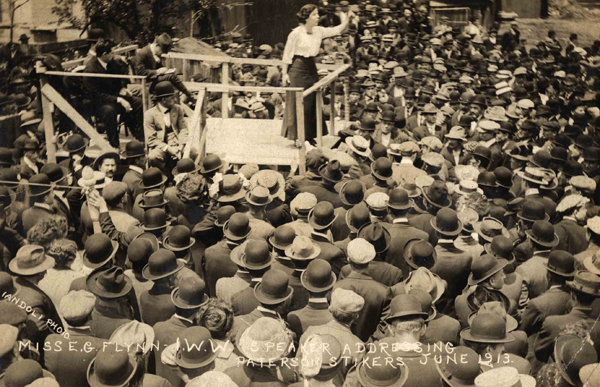
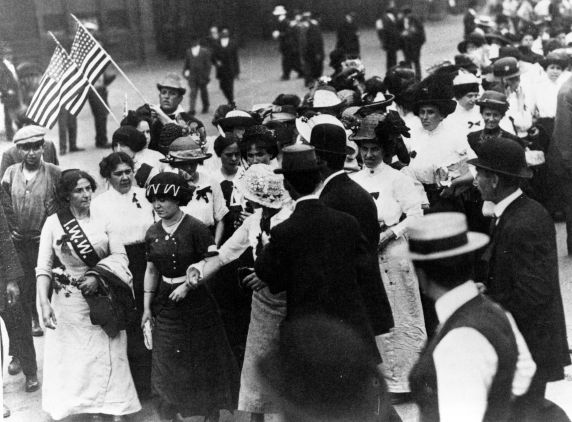

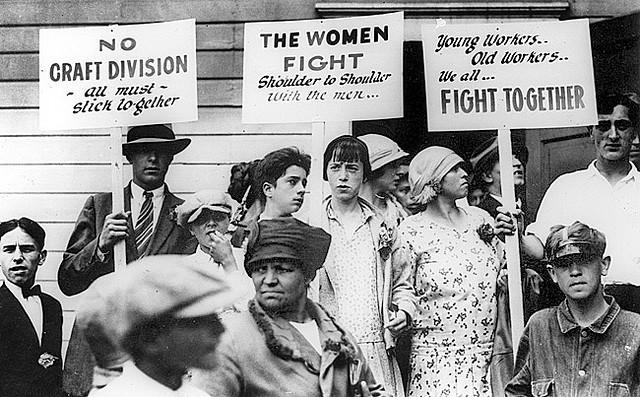







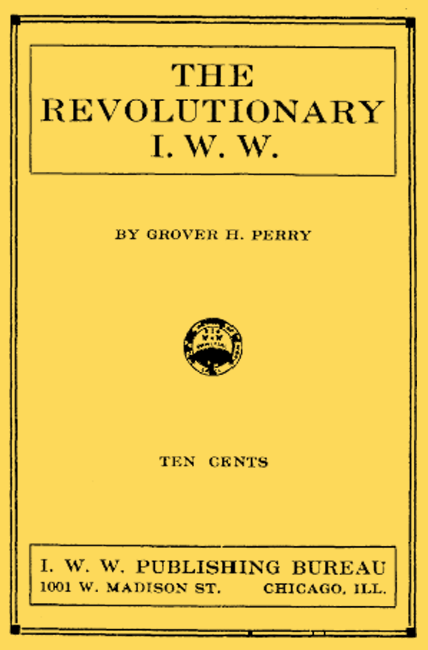
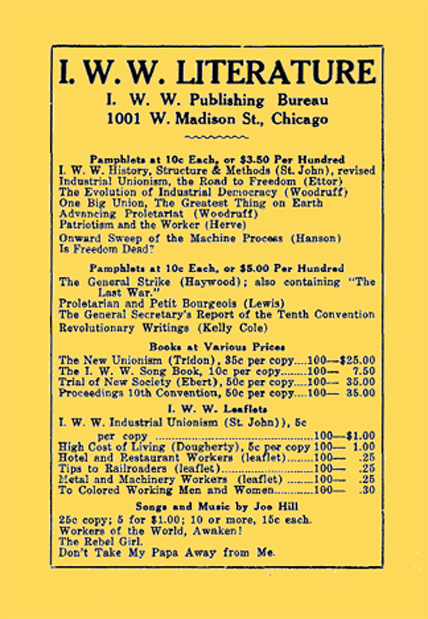
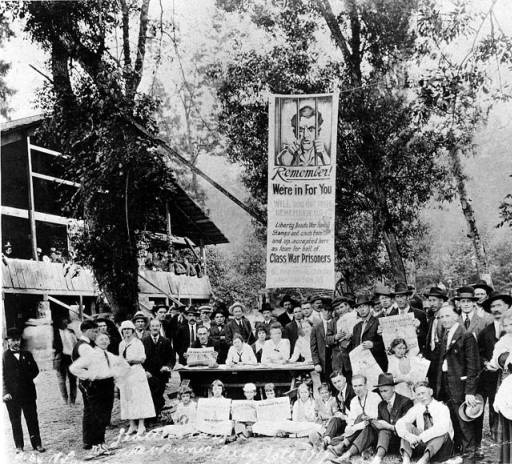
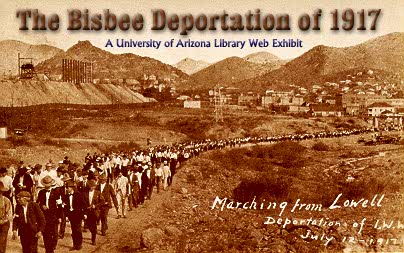
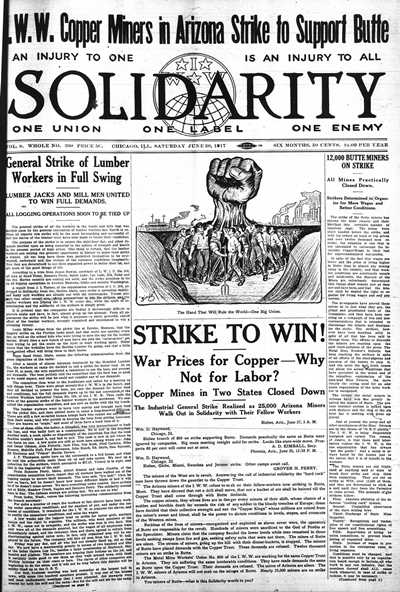
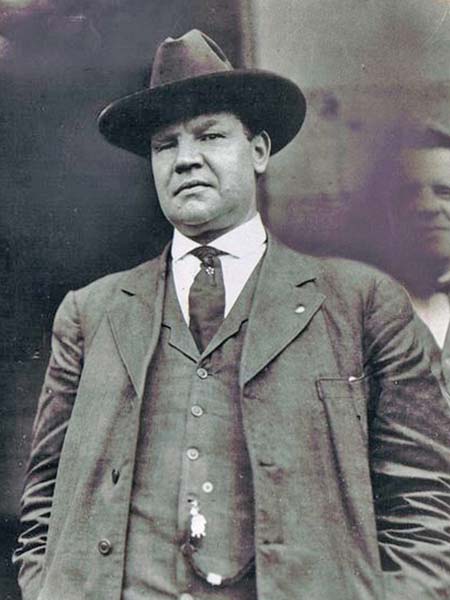 William "Big Bill" Haywood was the lead defendant in the Chicago trial that opened April 1, 1918.
William "Big Bill" Haywood was the lead defendant in the Chicago trial that opened April 1, 1918.